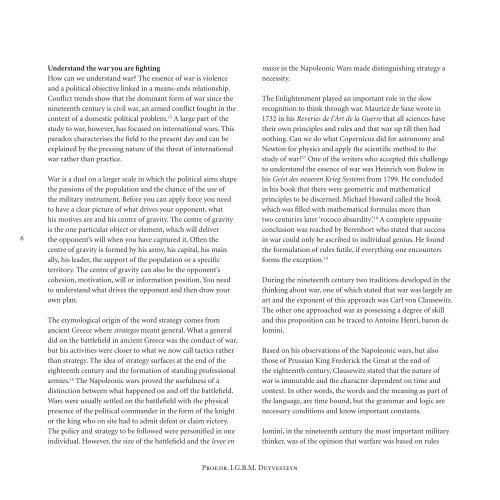Oratie Duyvesteijn Eng
Oratie Duyvesteijn Eng
Oratie Duyvesteijn Eng
You also want an ePaper? Increase the reach of your titles
YUMPU automatically turns print PDFs into web optimized ePapers that Google loves.
6<br />
Understand the war you are fighting<br />
How can we understand war? The essence of war is violence<br />
and a political objective linked in a means-ends relationship.<br />
Conflict trends show that the dominant form of war since the<br />
nineteenth century is civil war, an armed conflict fought in the<br />
context of a domestic political problem. 15 A large part of the<br />
study to war, however, has focused on international wars. This<br />
paradox characterises the field to the present day and can be<br />
explained by the pressing nature of the threat of international<br />
war rather than practice.<br />
War is a duel on a larger scale in which the political aims shape<br />
the passions of the population and the chance of the use of<br />
the military instrument. Before you can apply force you need<br />
to have a clear picture of what drives your opponent, what<br />
his motives are and his centre of gravity. The centre of gravity<br />
is the one particular object or element, which will deliver<br />
the opponent’s will when you have captured it. Often the<br />
centre of gravity is formed by his army, his capital, his main<br />
ally, his leader, the support of the population or a specific<br />
territory. The centre of gravity can also be the opponent’s<br />
cohesion, motivation, will or information position. You need<br />
to understand what drives the opponent and then draw your<br />
own plan.<br />
The etymological origin of the word strategy comes from<br />
ancient Greece where strategos meant general. What a general<br />
did on the battlefield in ancient Greece was the conduct of war,<br />
but his activities were closer to what we now call tactics rather<br />
than strategy. The idea of strategy surfaces at the end of the<br />
eighteenth century and the formation of standing professional<br />
armies. 16 The Napoleonic wars proved the usefulness of a<br />
distinction between what happened on and off the battlefield.<br />
Wars were usually settled on the battlefield with the physical<br />
presence of the political commander in the form of the knight<br />
or the king who on site had to admit defeat or claim victory.<br />
The policy and strategy to be followed were personified in one<br />
individual. However, the size of the battlefield and the levee en<br />
masse in the Napoleonic Wars made distinguishing strategy a<br />
necessity.<br />
The Enlightenment played an important role in the slow<br />
recognition to think through war. Maurice de Saxe wrote in<br />
1732 in his Reveries de l’Art de la Guerre that all sciences have<br />
their own principles and rules and that war up till then had<br />
nothing. Can we do what Copernicus did for astronomy and<br />
Newton for physics and apply the scientific method to the<br />
study of war? 17 One of the writers who accepted this challenge<br />
to understand the essence of war was Heinrich von Bulow in<br />
his Geist des neueren Krieg Systems from 1799. He concluded<br />
in his book that there were geometric and mathematical<br />
principles to be discerned. Michael Howard called the book<br />
which was filled with mathematical formulas more than<br />
two centuries later ‘rococo absurdity’. 18 A complete opposite<br />
conclusion was reached by Berenhort who stated that success<br />
in war could only be ascribed to individual genius. He found<br />
the formulation of rules futile, if everything one encounters<br />
forms the exception. 19<br />
During the nineteenth century two traditions developed in the<br />
thinking about war, one of which stated that war was largely an<br />
art and the exponent of this approach was Carl von Clausewitz.<br />
The other one approached war as possessing a degree of skill<br />
and this proposition can be traced to Antoine Henri, baron de<br />
Jomini.<br />
Based on his observations of the Napoleonic wars, but also<br />
those of Prussian King Frederick the Great at the end of<br />
the eighteenth century, Clausewitz stated that the nature of<br />
war is immutable and the character dependent on time and<br />
context. In other words, the words and the meaning as part of<br />
the language, are time bound, but the grammar and logic are<br />
necessary conditions and know important constants.<br />
Jomini, in the nineteenth century the most important military<br />
thinker, was of the opinion that warfare was based on rules<br />
Prof.dr. I.G.B.M. Duyvesteyn
















